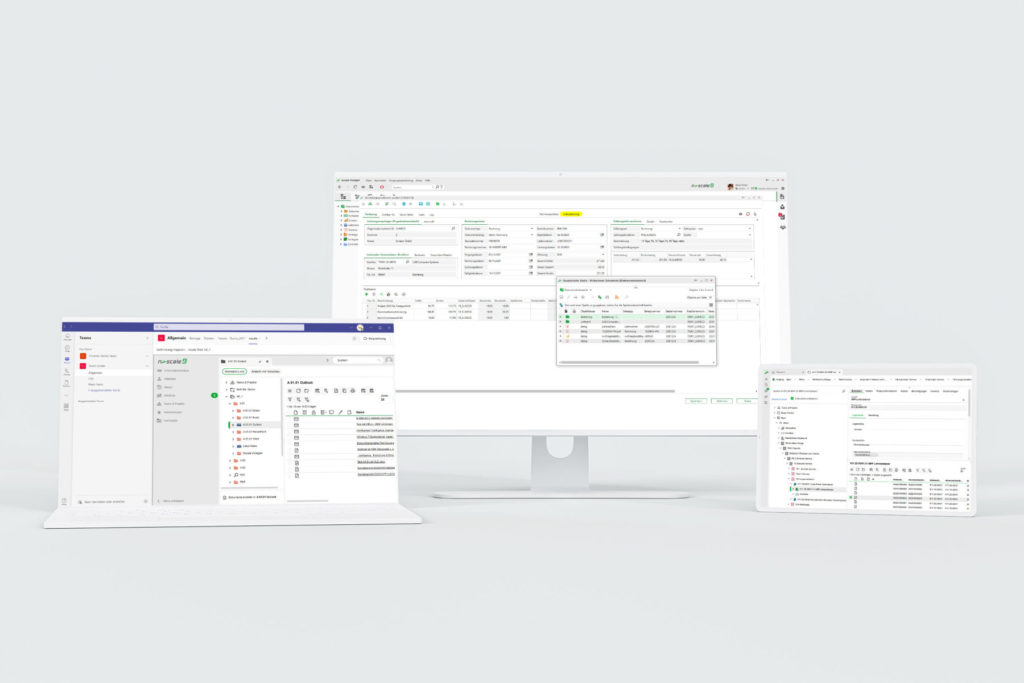Access rights under control at all times
nscale helps you to manage access rights for data and documents at your company.
New work – security is key
Digitalisation has turned the world of work on its head, and this development is set to continue. Coordinating tasks among teams spread across the globe, the switch to working from home, responding flexibly to emails, and working on presentations on the train on the way to the next event – this is all possible thanks to smart devices and increasing connectivity. Yet despite all the benefits – increased efficiency, higher productivity, more agile team structures and more motivated staff – this new approach to work also carries risks. Arguably the greatest risk is that of unauthorised persons gaining access to business secrets. That is what makes professional management of access rights across the entire organisation so important.
The right permissions in every situation
Managing so many different data and documents presents challenges for any organisation. When people join the company, or move to new jobs with different tasks, they need access to all the information relevant to them from day one. Conventional permissions, such as those used in the Windows file system (ACLs), are not suitable for use in organisations with a lot of documents they need role-based rights. This strategy flexibly configures and assigns rights to object classes, attributes and templates. There is also the option of using visibility rules to make objects “invisible” to certain users Visibility rules are an additional permission option that can be configured with a great deal of detail, e.g. to attribute values. You can set up and control these permission structures centrally via the administration.
However, there will always be situations that demand a more agile approach to permissions, e.g. in project files. NCL (nscale Control List) allows – in a similar way to Windows ACLs – defined users (e.g. a project manager) to assign permissions in addition to the defined access rights. As a result, project situations that go beyond role-based permissions can be depicted as standard.
Defining permissions in SAP
Large organisations administrate permissions for numerous applications. Each of these applications has its own philosophy and its own configuration interface. You can control many permissions via central directory services (e.g. Active Directory). Until now, however, you had to set application-specific permissions, such as for a time-tracking system, in the application itself. For SAP users, Ceyoniq now offers a different way: here you can set nscale permissions directly in SAP using a plugin. The advantage is obvious: the SAP administrator can set all nscale permissions in their usual application for nscale solutions. This brings us closer to the user and makes administration

Your benefits at a glance
- Professional management of access rights
- Fast response to changes in role profiles
- Simple adaptation to changes in employee structure
- Business-critical information secure against unauthorised access
- Pre-defined rights and role concepts with little administrative work
- Secure communication between the various nscale server components and clients
- Central management of large quantities of data and documents
- Simple administration environment for large installations
- Integration of permissions management in SAP
- Specialist administration
- Central and local permissions possible as standard
- Integration into various directory services (e.g. Microsoft AD or LDAP)
With nscale, you have your access management under control at all times
As an enterprise information management system, nscale ensures that only employees who really need it are granted access to the information. The Head of Production, for example, of course has permission to view the list of purchasing prices for the components needed to produce a product. Staff in Marketing or HR, however, do not usually need this access. On the other hand, colleagues in HR manage sensitive personnel files that are only intended for a very limited group of people and must never get into the wrong hands. Every role that exists in a company, from the Head of Production to Marketing, HR and all the other departments, is granted the access rights relevant for conducting their tasks. Using nscale, you can rule out the possibility of unauthorised staff being able to view sensitive documents. Your business secrets are safe with us.